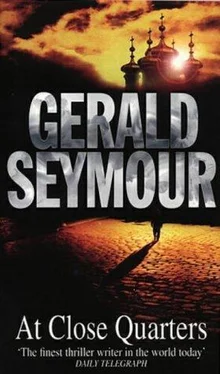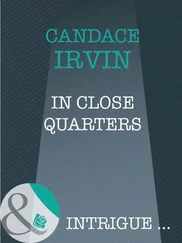Gerald Seymour - At Close Quarters
Здесь есть возможность читать онлайн «Gerald Seymour - At Close Quarters» весь текст электронной книги совершенно бесплатно (целиком полную версию без сокращений). В некоторых случаях можно слушать аудио, скачать через торрент в формате fb2 и присутствует краткое содержание. Жанр: Триллер, на английском языке. Описание произведения, (предисловие) а так же отзывы посетителей доступны на портале библиотеки ЛибКат.
- Название:At Close Quarters
- Автор:
- Жанр:
- Год:неизвестен
- ISBN:нет данных
- Рейтинг книги:3 / 5. Голосов: 1
-
Избранное:Добавить в избранное
- Отзывы:
-
Ваша оценка:
- 60
- 1
- 2
- 3
- 4
- 5
At Close Quarters: краткое содержание, описание и аннотация
Предлагаем к чтению аннотацию, описание, краткое содержание или предисловие (зависит от того, что написал сам автор книги «At Close Quarters»). Если вы не нашли необходимую информацию о книге — напишите в комментариях, мы постараемся отыскать её.
At Close Quarters — читать онлайн бесплатно полную книгу (весь текст) целиком
Ниже представлен текст книги, разбитый по страницам. Система сохранения места последней прочитанной страницы, позволяет с удобством читать онлайн бесплатно книгу «At Close Quarters», без необходимости каждый раз заново искать на чём Вы остановились. Поставьте закладку, и сможете в любой момент перейти на страницу, на которой закончили чтение.
Интервал:
Закладка:
He understood why the exhaustion seeped through him… He was helpless… He was led on and on by a man with disease clawing at the retina of his right eye.
He was with a marksman who had taken a contract in order to finance a one in five chance operation to reverse the decline in the sight of the shooting eye. He himself was blind, his king's good eye was done for… and he had to live with it. In the first part of that night's march, up to the first rally point, he had felt a bursting anger towards Crane. The anger was gone, knocked away by the tiredness in his legs, the soreness of his feet. He felt a sort of sympathy. But it was bloody pointless, feeling sympathy for Crane. Sympathy was no salve for the disease in the retina.
They went west and high to bypass the village of Ain Zebde. They would climb to avoid the village town of Khirbet Qanafar. Beyond the glow of Khirbet Qanafar, two and a half miles ahead, they would come down the hill slope until they overlooked the tent camp.
It was late into the evening.
The city was a mysterious place of flickering headlights and of candle-thrown shadows.
Another power cut in Damascus. The cutting of the electricity supplies was more frequent that month, a cut that would last five hours and there was nothing remarkable in that. The traffic moved through a wraith like haze of exhaust fumes. The cafes were lit by the wavering flames of the candles. Abu Hamid saw that few of the cafes had lanterns lit. There was a shortage of oil for the power station, also a shortage of paraffin lor the public.
His mind was bent by the weight of detail forced upon him by the Brother. Through the afternoon, through the rvening, he had listened and attempted to absorb the attack plan against the Defence Ministry on Kaplan as described to him by the Brother. He had been allowed to write nothing down, everything he had been told had to be committed to memory. He knew the numbers of the men involved. He knew the fire power they would carry. He knew the harbour from Cyprus out of which he would sail, he knew the times of the tide changes that would dictate the time of sailing. He knew the speed at which the coastal tramp ship would travel. He knew of the diversionary tactic that had been planned to draw away the patrolling missile boats. He knew of the two closed vans that sympathisers would drive to the shore line at Palmahim, south of Tel Aviv. He knew of the driving time from the shore line to the buildings on Kaplan. He knew of the defences of the ministry complex.
Through the cacophony of the horns, through the darkened traffic lights, through the swirling crowds of the souq, the jeep pressed its way towards the alley.
The jeep shuddered to a halt. The headlights lit a drover who flailed at the back of a horse that refused to pull further a cart laden with vegetables. From the way the horse refused to ground its left front hoof, Abu Hamid thought the horse to be lame. The jeep driver was shouting at the drover. The drover was shouting at his horse. He slipped open his door. He slammed the door shut after him. He was gone into the night, into the flow of the crowds. He was no longer the Palestinian who had been chosen to sail onto the beach at Palmahim which was south of the city of Tel Aviv. He was no longer the man on whose forehead the spot of the martyr had been painted. He could have turned, he could have cut into the narrow lanes. He could have fled. He was a moth, the alley was the lamp, the woman was the light.
When he knocked at the door, she opened it to him.
She wore the loose dress of an Arab woman.
He saw the soft whiteness of the skin on her throat.
He saw the curved fullness of her breasts and of her hips.
He saw the hands that reached for his face in welcome.
She was Margarethe Anneliese Schultz.
At Wiesbaden in the Federal Republic of Germany, in the computerised records section of the Bundesamt fur Verfassungsschutz, the printout directly relating to her history, biography and activities would, on a continuous roll of paper, stretch to 235 inches. That part of the Federal Internal Security Office devoted in its work to the destruction of urban guerrilla movements inside the state was indeed familiar with Margarethe Anneliese Schultz.
She was now 33 years of age. She had been born the only daughter of a pastor serving a small community a few kilometres to the north of Munich. As an only daughter she had been a spoilt and privileged child.
Early in her life she had learned the art of winning her way either by tantrums or by sweet smiles. Within the budget of her parents' household her every whim had been granted.
Excellent grades in her final school examinations led to her admission as a student of social sciences to the Free University of West Berlin. Her father had a married cousin living in the city. Her father had believed that it would be a good thing for the young girl to continue her education away from home, while at the same time remaining under the eye of the family. It had been the summer of 1974 when Margarethe Anneliese Schultz had left home with her two suitcases to take a train to Frankfurt, and another train to West Berlin.
That late summer the Federal Republic recovered from the excesses brought on by victory in the World Cup soccer tournament, and awaited the death of a judge shot dead at his front door, and the death of Holger Meins from self-inflicted starvation, and the sentencing of Ulrike Meinhof.
From the day they waved their goodbye, as the long distance express train pulled away from the platform at Munich's Hauptbahnhof, Doktor and Frau Schultz had not set eyes on their beloved daughter. One letter only had been received by them, written a week after her arrival in West Berlin. Margarethe Anneliese Schultz had within a month of her arrival in West Berlin dropped out of her course, dropped into underground cover. She had been recruited into a cell of a Red Army faction that sought to revive the drive of armed insur-rection on behalf of an oppressed proletariat as first initiated by Ulrike Meinhof and Andreas Baader and Jan-Carl Raspe and Gudrun Ensslin and Holger Meins.
In a world of heady excitement she became a part of the small core of revolutionaries living in sympathisers' apartments, stretching her legs to the newest young man who carried a Firebird 9 mm Parabellum pistol, eating in restaurants on the proceeds of bank robberies, moving in stolen BMWs and Mercedes saloons.
Her parents had reported her missing to the Munich city police.
Eight months after she had left them, men of the
"P0P0", the political police, had called on the pastor. had interviewed him in the living room of his home, and after 35 minutes had left him in prayer on his knees and with the comfort of his wife.
The pastor's daughter was a bank robber. The pastor's sweet child had driven the getaway car from a robbery in which a policeman had been fatally shot.
The pastor's angel was on the list of those hunted by the political police, the criminal police and the security police.
Her induction had been through a working circle, photography. It had been her initial role to photograph targets for assassination, targets for bombing. Her hand was steady. Her photographs were crystal sharp in focus. The years passed. The Red Army faction slaughtered the high and the mighty of the state. The capitalist exploiters were cut down. Chief Federal Prosecutor Siegfried Buback, executed. Chief Executive of the Dresdner Bank Jurgen Ponto, executed. Military attache to the FRG embassy in Stockholm, Baron von Mirbach, executed. President of the Federation of Industries Hanns-Martin Schleyer, executed. The government stood firm. The killings did not win the freedom of the founding fathers and mothers of the movement. There was a week when despair became a plague. A Lufthansa holiday jet hijacked to Mogadishu in the African state of Somalia was retaken by the intervention of the Grenzschutz Gruppe Neun. The principal imprisoned activists hanged or shot themselves in their cells. The movement sagged under the failure of action and the loss of the star participants. Margarethe Anneliese Schultz, her face on the wanted posters, her name on the charge sheet of a Federal court, her future likely to be 20 years behind bars, drove into Switzerland, took a train to Italy, bought an airline ticket to Damascus.
Читать дальшеИнтервал:
Закладка:
Похожие книги на «At Close Quarters»
Представляем Вашему вниманию похожие книги на «At Close Quarters» списком для выбора. Мы отобрали схожую по названию и смыслу литературу в надежде предоставить читателям больше вариантов отыскать новые, интересные, ещё непрочитанные произведения.
Обсуждение, отзывы о книге «At Close Quarters» и просто собственные мнения читателей. Оставьте ваши комментарии, напишите, что Вы думаете о произведении, его смысле или главных героях. Укажите что конкретно понравилось, а что нет, и почему Вы так считаете.












